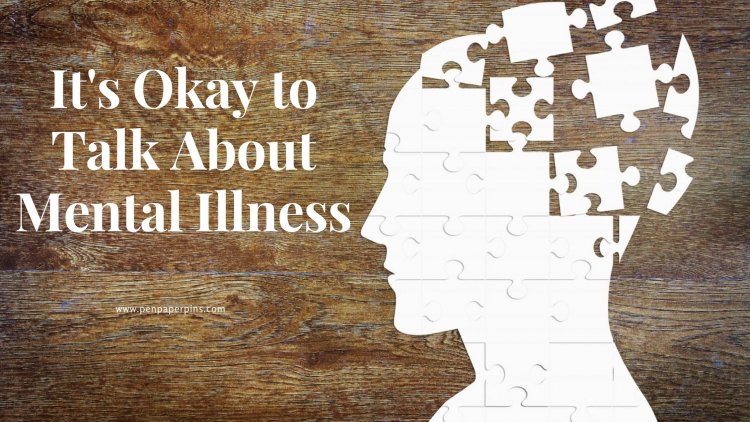It's Okay to Talk About Mental Illness

Firstly, ask yourself one question, what do you know about mental health?
“Mental illness is nothing to be ashamed of, but stigma and bias shame us all” – a famous quote by Bill Clinton say it all.
- Definition of mental health given by WHO is “a state of well-being where the individual realizes his or her abilities, can bear up with the normal stresses, occurring in life, able to work productively and efficiently, by a significant contribution to his or her community.” It also highlights the fact that mental health “is not just the absence of a mental disorder.”
- MAIN DIFFERENCE BETWEEN MENTAL ILLNESS AND MENTAL DISORDERS: Classifying a mental condition as a disorder or illness is quite controversial and tricky since both the terms can be used interchangeably. However, some experts suggest the cause of that particular condition to differentiate mental illness and mental disorder.
- Mental illness, also called mental health disorders, refers to a wide range of mental health conditions - a behavioural or mental pattern that causes significant distress or impairment of personal functioning. It is characterized by a set of discernible signs and symptoms and occurs as a result of various etiological conditions like infections, genetic defects, and environmental factors.
- A disorder is a disruption to regular bodily structure and function that starts hindering one’s daily activities. A mental disorder is defined as a change that takes place in an individual’s thinking patterns and emotions which easily impedes the performance of his day to day activities, mostly due to disturbances taking place in the brain.
- CAUSES OF MENTAL ILLNESS: Every person has a risk of developing mental illness, irrespective of their age, sex, income or status. A section of people with mental health disorders has more than one condition at a time. A list of factors that contribute to mental illness:
- GENETIC FACTORS: The National Institute of Mental Health suggests that people whose blood relatives have a mental illness are more likely to develop a mental health disorder as certain genes and gene variants put a person at higher risk.
- ENVIRONMENTAL EXPOSURES BEFORE BIRTH: Exposure to environmental stressors, drugs, toxins or alcohol while in the womb can sometimes lead to mental illness.
- BRAIN CHEMISTRY: Brain chemistry plays a major role in mental illness. Changes and imbalance in neurotransmitters ( naturally occurring chemicals that carry signals to other parts of the brain and body) are often related to mental illness. It causes the impaired function of nerve receptors and thus nerve system changes leading to depression and other mental health disorders.
- LIFE EXPERIENCES: Stressful life events can also be one of the reasons leading to mental illness.
- TYPES OF MENTAL ILLNESS: There are many types of mental illness, with different levels of presentations. Some of them are explained under:
1. DEPRESSION: is the most common and serious type of mental illness that negatively affects how a person feels, thinks and acts. It causes a feeling of sadness and/or a loss of interest or pleasure in activities a person once enjoyed. Globally, an estimated 264 million people are affected by depression. More women are affected than men.
- It can lead to a variety of emotional and physical problems and can decrease one’s ability to function at work and in life.
- Symptoms include: Feeling sad, loss of appetite, feelings of guilty or low self-esteem, disturbed sleep or sleeping too much, poor concentration, tiredness or fatigue, increase in purposeless activities, death/suicidal thoughts.
- Treatment: It is among the most treatable of mental illnesses. 80%-90% of people with depression eventually respond well to treatment.
- Mild to moderate depression can be effectively treated with talking therapies, such as cognitive behaviour therapy or psychotherapy.
- Antidepressants can be an effective form of treatment for moderate to severe depression but are not the first line of treatment for cases of mild depression.
2. ANXIETY DISORDERS: A group of mental illnesses characterized by feelings of worry, anxiety or fear that are strong enough to interfere with one’s daily life activities accompanied by physical symptoms like shortness of breath, shivering, dizziness, sweating or rapid heartbeat.
- Three major anxiety disorders are:
- An anxiety disorder is diagnosed if the person's response is not appropriate for the situation, if the person cannot control the response or if the anxiety interferes with normal functioning.
- Treatment: There's no way to predict for certain what will cause someone to develop an anxiety disorder, but you can take steps to reduce the impact of symptoms if you're anxious:
- Get help early. Anxiety, like many other mental health conditions, can be harder to treat if you wait.
- Stay active. Participate in activities that you enjoy and that make you feel good about yourself. Enjoy social interaction and caring relationships, which can lessen your worries.
- Avoid alcohol or drug use. Alcohol and drug use can cause or worsen anxiety. If you're addicted to any of these substances, quitting can make you anxious. If you can't quit on your own, see your doctor or find a support group to help you.
3. SCHIZOPHRENIA: It is a mental health condition that has an impact on speech, thinking, emotions and other areas of life that can affect a person’s social interactions and everyday activities.
- Symptoms include Confused speech, Lack of facial expression, Lack of emotional expression, Lack of motivation, Difficulty concentrating, Psychosis such as delusions and hallucinations.
- Treatment: Treatment with medicines and psychosocial support is effective. With appropriate treatment and social support, affected people can lead a productive life and be integrated with society.
4. BIPOLAR DISORDER: A disorder associated with episodes of mood swings ranging from depressive lows to manic highs.
This disorder affects about 45 million people worldwide.
- Symptoms include: Manic episodes include elevated or irritable mood, rapid speech, hyperactivity, distended self-esteem and a decreased need for sleep.
- Treatment: Effective treatments are available for the treatment of the acute phase of bipolar disorder and the prevention of relapse. These are medicines that stabilize mood. Psychosocial support is an important component of treatment.
5. NEURODEVELOPMENTAL DISORDERS: These disorders typically manifest early in development, often before a child enters grade school. They are characterized by impairments of personal, social, academic, or occupational functioning.
- Examples of neurodevelopmental disorders include:
- Attention-deficit/hyperactivity disorder(ADHD)
- Autism
- Learning and intellectual disabilities
- TIPS FOR HOW TO DEAL WITH A PERSON WITH A MENTAL ILLNESS:
- Learn About Their Illness: In a society where severe mental illness is often wrapped in damaging myths, preconceived notions, fears and misconceptions, it is very important to understand your loved one’s condition in-depth to provide them meaningful support. It’s important to listen to and acknowledge what your loved one is personally experiencing rather than projecting your vision of mental illness onto them.
- Listen With Empathy and Validation: People with severe mental illness often feels that people around them do not understand their experiences and thus they develop a feeling of shame, guilt and isolation. Give them space to express their feelings, listen and make them feel that they are heard. Ask them how they are feeling and what they are going through and reassures them that you won’t judge them.
- Encourage Treatment: Offer to help make those first appointments with a doctor to find out what’s wrong or accompany the person, write down any notes or questions either of you have in advance so that you cover all the major points.
- Be a good listener, be responsive and make eye contact with a caring approach
- Provide Emotional Support: One can play an important role in helping someone who’s not feeling well, feel less alone and ashamed. They are not to blame for their illness, but they may feel that they are. Help encourage hope. Be respectful, compassionate and empathetic to their feelings by engaging in reflective listening. Ask them appropriate questions and avoid prying.
Naturally, everyone wants their loved ones to recover from any illness super quick and completely as possible. But it is important to be patient and do not lose hope or treat your loved ones as a failure if they don’t recover on the scheduled time you have imagined. Accept the nature of their illness, believe that your loved one is doing what they can to recover, and trust in the treatment process.
What's Your Reaction?



































































































